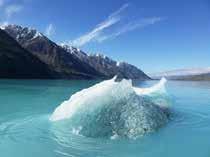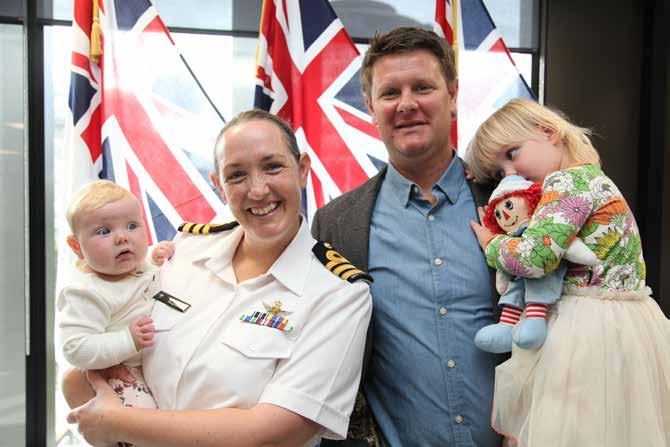
6 minute read
Ice detection technology
An Icy Mission
A team of Defence Technology Agency (DTA) scientists is on a mission to help mitigate one of the biggest risks to vessels travelling in the Southern Ocean and Ross Sea: the threat of hitting an undetected iceberg.
Advertisement
The specialists, including a Royal New Zealand Navy Combat System Specialist, recently carried out a preliminary ice detection trial at Tasman Lake in Aoraki/Mount Cook National Park, with support from Department of Conservation and local tour boat operator Glacier Explorers. The five-day trial was undertaken to test current and new ice detection systems, ahead of a vessel-based trial in HMNZS AOTEAROA on its first voyage to Antarctica in January 2022. Tasman Lake is a large glacier lake with floating pieces of ice and also has a lake shore suitable for installing temporary sensors, making it the ideal testing ground. Floating pieces of ice, which are often too small to see at a distance but large enough to cause substantial damage, pose a very real threat to the success of NZDF maritime operations in the Southern Ocean and Ross Sea.
There have been multiple collisions with icebergs in the past 15 years in Antarctic waters. Two recent incidents include vessels Xue Long (Snow Dragon) and Explorer. In 2019 Xue Long, a Chinese Polar Research Ship, sustained significant damage after hitting an iceberg in foggy conditions, while in 2007 the Canadian Cruise Ship MS Explorer sank after ploughing into an icy mass. More than 100 passengers and crew were successfully rescued before the ship went down.
It is hoped sensor-based ice detection, coupled with sea ice forecasting, will reduce or even prevent future incidents.
The AOTEAROA trial will involve ice detection sensors as well as drones, ice tracking devices, atmospheric measurements and data collection and is expected to take around two days to complete. The recent Tasman Trial has meant the team has been able to thoroughly test all systems, de-risking and allowing detailed planning for the AOTEAROA trial.


Growing a family and a career
Commander Alex Haughey says she feels “valued and appreciated” in receiving her promotion to Commander while on maternity leave.
CDR Haughey was joined by her husband Simon and daughters Grace and Annie in her promotion at Defence House last month. She pointed out to Navy Today that she wasn’t coming to work during leave, but was using some of her 64 allocated paid hours of ‘keeping in touch’ available whilst still receiving Paid Parental Leave. That’s a relatively new initiative for maternity leave for New Zealanders, but the culture of maternity leave, of having a family while serving, is now well established. “No-one rolls their eyes at you when you give a valid reason for not being able to do something,” she says. “There’s an understanding that you are just as valuable to the organisation, that you haven’t stopped your ability to contribute even though you’re working flexibly and your priorities have changed. The other day, when I came in for my pre-promotion meeting, I brought my five-month old in, and people including DCN (Deputy Chief of Navy) were lining up to look after her for me.” That’s a contrast to the world view of CDR Haughey when she was 27, then Lieutenant Alexandra Hansen and receiving a reasonable amount of national publicity as one of the Navy’s newest female Commanding Officers. Joining the Navy in 2005, she was the first female appointed in command of an RNZN vessel when she took command of HMNZS PUKAKI, an Inshore Patrol Vessel, in 2010. It came out in a newspaper article that she would like to have a family at some stage, but wasn’t sure if it was “compatible” with naval service. “I’m going to have to find that article,” she says. “I was 27, 28, and I didn’t see a pathway [to family] necessarily. I was really only just starting to think about it. But I do remember that the Chief of Navy at the time was concerned about what I had said.”
She thinks she was probably a bit institutionalised and focused on her career. “I joined the Navy to go to sea, and a big requirement is to spend a lot of time away from home. And that isn’t necessarily conducive to having a family.”

Her career has been an exciting one. She duxed both her Officer of the Watch Basic and Advanced courses and received a posting to the Royal Navy for a year-long exchange, serving in HM Ships EXETER and EDINBURGH on Atlantic patrols to the Falkland Islands.
As Commanding Officer of PUKAKI, up until December 2011, she was involved in the RV RENA recovery operation and the Christchurch earthquake recovery. She has been part of Combined Task Force 151 (Counter Piracy) in Bahrain, before joining HMNZS TE KAHA as a Principal Warfare Officer in 2015, becoming the Operations Officer. This was a time when TE KAHA was conducting successful counter-narcotics operations in the Indian Ocean. Today, she feels enormously supported, and acknowledges she has been privileged to have great family support as well as Navy support. “It’s always been there. There’s never been any negative conversations, and no bad treatment.” She acknowledges that she has had to be deliberate about planning a family. “I really wanted the bulk of my sea service out of the way before having children. I didn’t want to be in a position of needing to do too many sea jobs after having kids.” She acknowledges you can’t have it all. “You can have lots these days. You can have more than you used to be able to have, but I don’t think you can have it all, all at once. Everything is about compromise. But there is great choice, and it’s yours. You can decide what you want and go for it, and that wasn’t always the case. The way the Navy and wider NZDF has matured, and the conversations we’re having, show that there’s a lot more value and thought given to the priorities of people as people.” She says it’s not just about mothers, but fathers – families – as well. “We want people to return to work and contribute. I’ve definitely had the most flexible return-to-work experience, and I’ve been lucky, but at the same time, our biggest challenge as a family is yet to come. I have aspirations to head back to sea and command a Major Fleet Unit. I have seen other mums and dads do this successfully and I’m up for the challenge when the time comes.”



